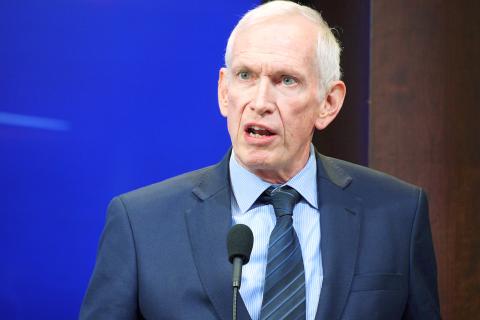American Institute in Taiwan (AIT) Chairman James Moriarty on Thursday called on Taipei to invest more in self-defense, as the US’ commitment to Taiwan’s security alone will not protect the nation in an increasingly complex regional environment.
While Moriarty reiterated the US’ commitment to providing defense services to Taiwan, he asked that Taipei increase its defense spending, which he said falls short of what is needed to address the changing environment.
“While we commend Taiwan for the considerable strides it has made, it can and must do more as the security threat against it continues to evolve,” Moriarty told a forum on Taiwan-US relations held by the Washington-based Brookings Institution.

Photo: CNA
He compared Taiwan’s military spending as a percentage of GDP with that of other nations facing outside threats, such as Israel, South Korea and Ukraine, and found it lacking.
“Taiwan must do better,” Moriarty said. “We believe that a Taiwan that is secure, confident and free from both isolation and coercion is better able to engage Beijing constructively.”
Moriarty in his speech championed not just Taiwan-US security cooperation, but also an expanded economic partnership.
“Taiwan faces both security and economic challenges, and thus, Taiwan’s continued economic security and vitality are equally important to the United States,” he said.
Just as Taiwan-US political relations will continue to function under the guidelines of the US’ Taiwan Relations Act, Taiwan-US economic relations will continue to work under the framework of the Trade and Investment Framework Agreement, Moriarty said.
On cross-strait relations, Moriarty said that the US would continue to urge both sides of the Taiwan Strait to engage in constructive dialogue and “to demonstrate patience, flexibility and creativity in finding ways to engage with each other in order to avoid miscalculation and resolve their differences.”
He said there should be no unilateral attempt by either side to change the “status quo,” but rather urged a peaceful resolution of differences that is acceptable to the people of both sides.
Stable cross-strait relations are of interest not just to Taiwan and China, but also the US and countries in the Asia-Pacific region, Moriarty said.
Throughout his speech, Moriarty commended Taiwan’s willingness and ability to play a positive role in addressing global problems and asked that Taiwan take comfort in knowing that the discussion in Washington is not “whether to deepen our relationship with Taiwan,” but “how best to.”
The US would therefore continue to support Taiwan’s membership in international organizations in which statehood is not a requirement and its meaningful participation in organizations where statehood is required, Moriarty said.

Alain Robert, known as the "French Spider-Man," praised Alex Honnold as exceptionally well-prepared after the US climber completed a free solo ascent of Taipei 101 yesterday. Robert said Honnold's ascent of the 508m-tall skyscraper in just more than one-and-a-half hours without using safety ropes or equipment was a remarkable achievement. "This is my life," he said in an interview conducted in French, adding that he liked the feeling of being "on the edge of danger." The 63-year-old Frenchman climbed Taipei 101 using ropes in December 2004, taking about four hours to reach the top. On a one-to-10 scale of difficulty, Robert said Taipei 101

Nipah virus infection is to be officially listed as a category 5 notifiable infectious disease in Taiwan in March, while clinical treatment guidelines are being formulated, the Centers for Disease Control (CDC) said yesterday. With Nipah infections being reported in other countries and considering its relatively high fatality rate, the centers on Jan. 16 announced that it would be listed as a notifiable infectious disease to bolster the nation’s systematic early warning system and increase public awareness, the CDC said. Bangladesh reported four fatal cases last year in separate districts, with three linked to raw date palm sap consumption, CDC Epidemic Intelligence

Two Taiwanese prosecutors were questioned by Chinese security personnel at their hotel during a trip to China’s Henan Province this month, the Mainland Affairs Council (MAC) said yesterday. The officers had personal information on the prosecutors, including “when they were assigned to their posts, their work locations and job titles,” MAC Deputy Minister and spokesman Liang Wen-chieh (梁文傑) said. On top of asking about their agencies and positions, the officers also questioned the prosecutors about the Cross-Strait Joint Crime-Fighting and Judicial Mutual Assistance Agreement, a pact that serves as the framework for Taiwan-China cooperation on combating crime and providing judicial assistance, Liang

US climber Alex Honnold left Taiwan this morning a day after completing a free-solo ascent of Taipei 101, a feat that drew cheers from onlookers and gained widespread international attention. Honnold yesterday scaled the 101-story skyscraper without a rope or safety harness. The climb — the highest urban free-solo ascent ever attempted — took just more than 90 minutes and was streamed live on Netflix. It was covered by major international news outlets including CNN, the New York Times, the Guardian and the Wall Street Journal. As Honnold prepared to leave Taiwan today, he attracted a crowd when he and his wife, Sanni,